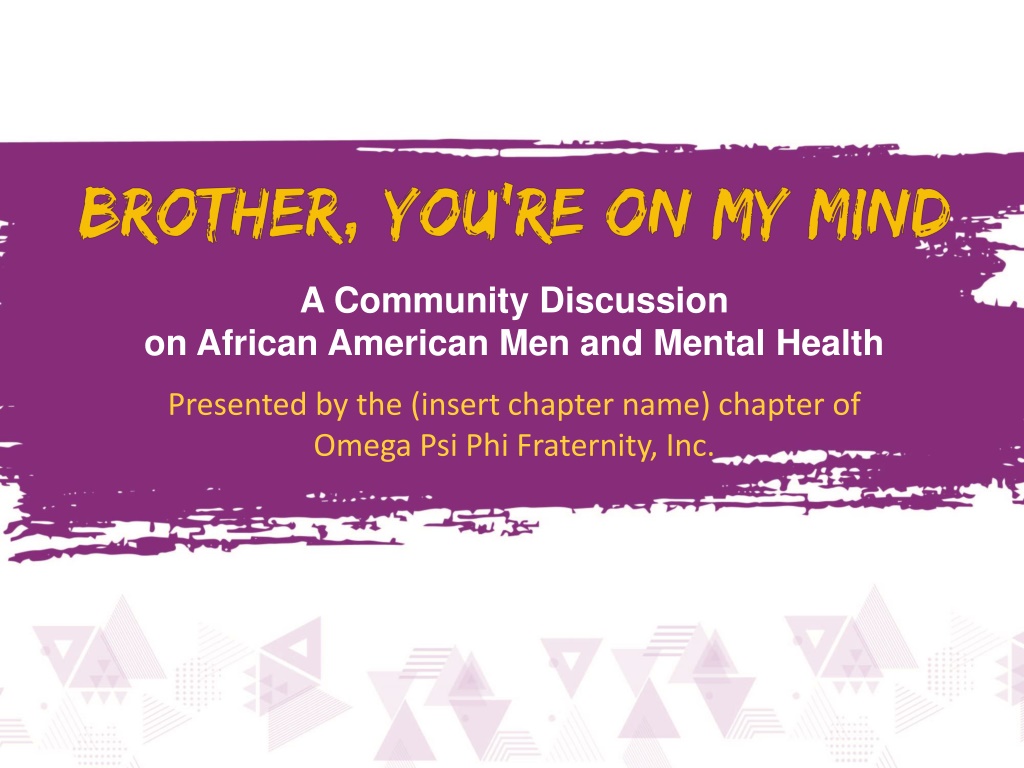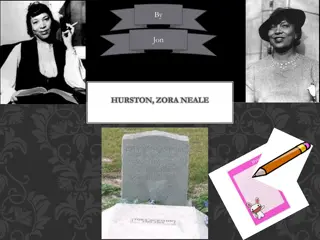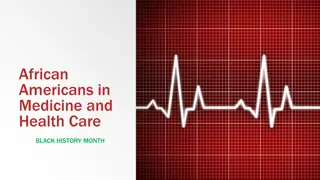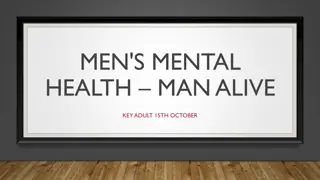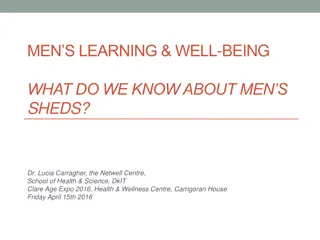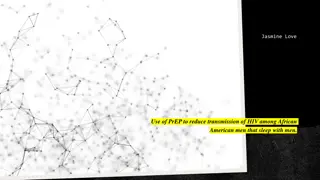Understanding African American Men's Mental Health Challenges
This community discussion presented by the Omega Psi Phi Fraternity highlights the importance of addressing mental health in African American men. It delves into recognizing signs, understanding barriers to treatment, and combating stigma. The initiative aims to start conversations, increase awareness, and offer support to improve mental well-being among African American men.
Download Presentation

Please find below an Image/Link to download the presentation.
The content on the website is provided AS IS for your information and personal use only. It may not be sold, licensed, or shared on other websites without obtaining consent from the author. Download presentation by click this link. If you encounter any issues during the download, it is possible that the publisher has removed the file from their server.
E N D
Presentation Transcript
A Community Discussion on African American Men and Mental Health Presented by the (insert chapter name) chapter of Omega Psi Phi Fraternity, Inc.
What is Brother, Youre on My Mind? Brother, You re on My Mind is an initiative from Omega Psi Phi Fraternity and the National Institute on Minority Health and Health Disparities (NIMHD) Our mission is to help start conversations about mental health in African American men. We want you to: Be able to recognize the signs and symptoms of mental illness in African American men Understand the barriers to treating depression that are unique to African American men Know what you can do to help yourself and your loved ones
What is Mental Health? Mental health includes our emotional, psychological, and social well-being Factors that contribute to mental health include: Genes or brain chemistry Life experiences, such as abuse or traumatic experiences A family history of mental problems
Barriers to Mental Health Treatment Reasons why so few African Americans receive mental health care include: Stigma Lack of access to care Lack of insurance Poor cultural understanding by therapists
Why Are We Afraid to Talk About Mental Health? Psycho Weirdo Crazy Schizo Basketcase Wacko Stigma is when someone views you in a negative way because you have a distinguishing characteristic or personal trait that s thought to be a disadvantage.
African American Men and Mental Health: A Snapshot 1 in 5 Americans struggle with mental illness every year. Suicide is the 3rd leading cause of death among African Americans ages 15 to 24. African American men are 4 times more likely to die by suicide than African American women are. The proportion of African Americans who need mental health treatment and get it is only half that of whites. African Americans are 20% more likely to have serious psychological distress than whites are.
Signs of Depression Depression symptoms can be different for each person. Common signs of depression in men: Aches, pains, headaches, cramps, or digestive problems Loss of interest in activities the person used to enjoy, including sex Problems concentrating, remembering information, or making decisions Trouble falling asleep or staying asleep, or sleeping too much
Signs of Depression Depression symptoms can be different for each person. Common signs of depression in men: Eating too much or not wanting to eat at all Thinking about or attempting suicide Experiencing feelings of guilt, worthlessness, helplessness, hopelessness, or pessimism
How Can You Be a Friend to Someone With Depression? Reach out. You may want to say: I ve been worried about you. How are you really? I ve noticed some changes in you lately, and I wanted to check in with you. It sounds like you re having a tough time. It must be really hard to try to hold everything together when you re feeling this bad. When did you start feeling like this? Did something happen that started it? I understand. How can I help you to find help? Feeling depressed isn t a sign of weakness. It takes courage to speak up.
How Can You Be a Friend to Someone With Depression? Don t make him regret opening up to you. It takes courage to speak about depression. DO NOT say: It s all in your head. You re just having a bad day. I m sure it s nothing to worry about. Man up. You can deal with this on your own. Why are you talking about this stuff? You don t want people to think you re crazy. Counseling is for sissies. What will your family say?
Treating Depression Depression is treatable and recovery is possible Treatment options include: Counseling Psychotherapy Medication A mental health professional can work with you to design a treatment plan that best fits your individual needs Faith and spirituality can be a part of your healing from depression
Maintaining Positive Mental Health Strategies that doctors recommend for maintaining positive mental health include: Keeping in touch with friends and family who can provide emotional support Engaging in physical activity every day Saying no to new responsibilities when your plate is full Getting enough sleep Seeking help from a mental health professional when stress becomes overwhelming
Resources For more information about the initiative, visit: www.oppf.org www.nimhd.nih.gov Mental Health Resources National Suicide Prevention Lifeline: 1-800-273-TALK (8255) Substance Abuse Mental Health Services Administration (SAMHSA) Treatment Referral Helpline: 1-877-SAMHSA7 (1-877-726-4727) National Alliance on Mental Illness (NAMI) HelpLine: 1-800-950-NAMI (6264) Add local resource Add local resource
